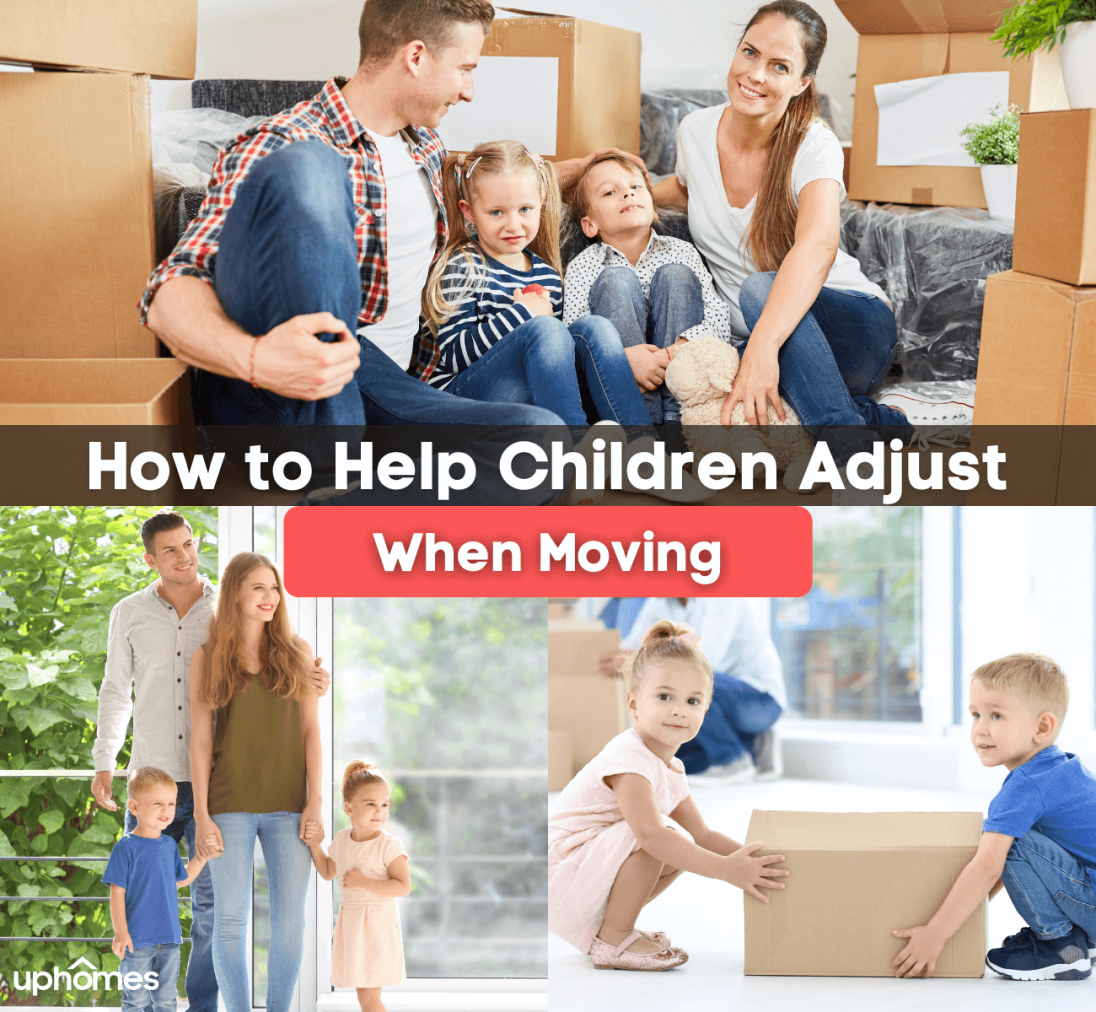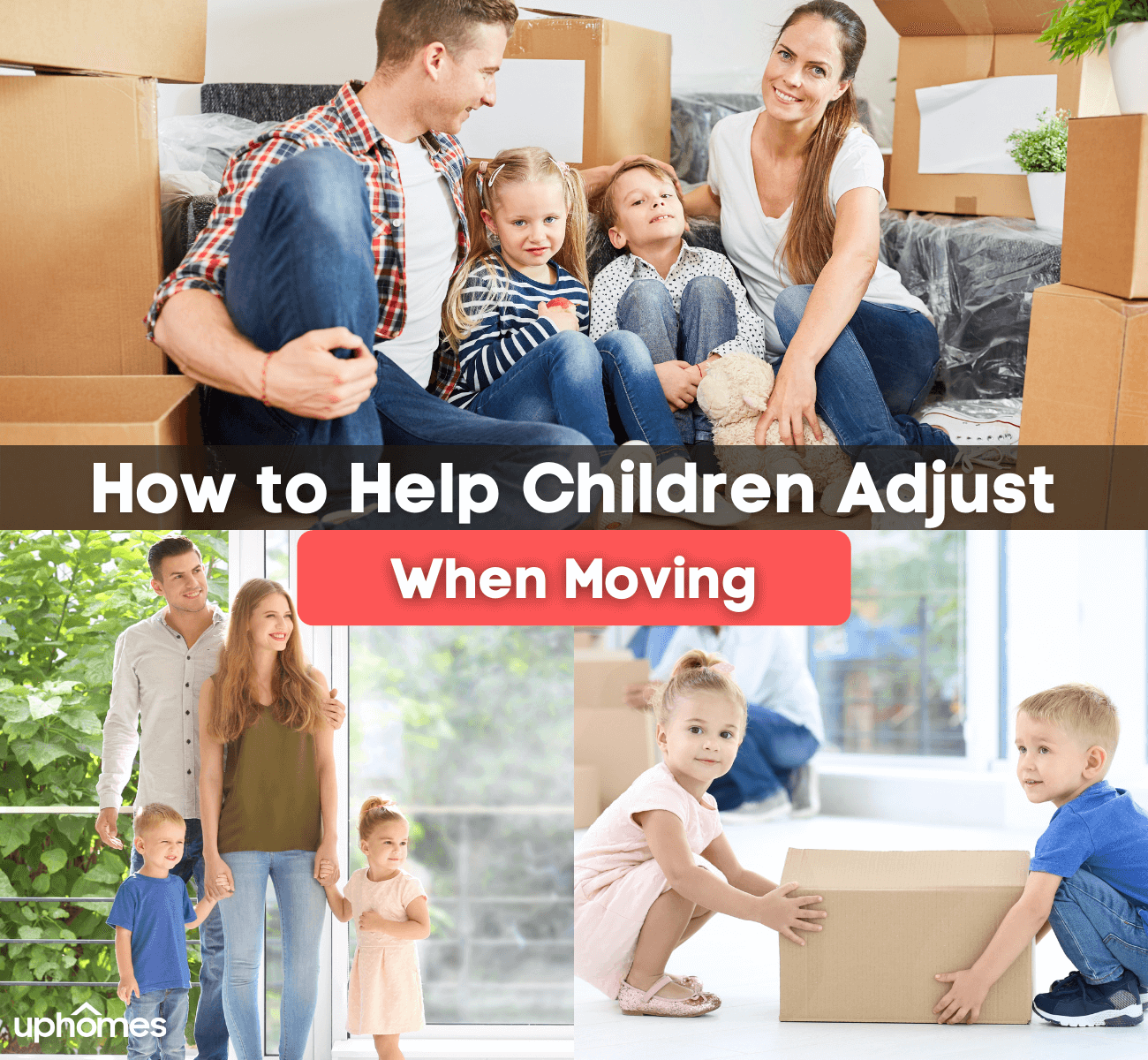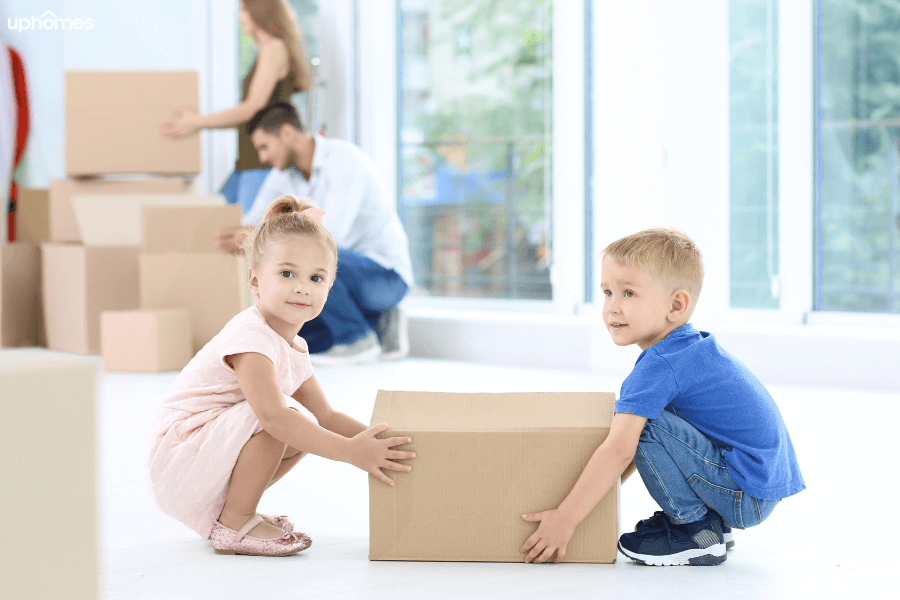7 Tips: How to Help Children Adjust to Moving
May 23rd, 2021

How to Help Children Adjust to Moving
While moving can be exciting, itcauses a good deal of short-term stress. In fact, moving is consistently ranked as one of the most stressful life events. Along with the physical aspects of moving -- packing, for instance -- you may also experience feelings of loss, anxiety, and fear.
If adults experience these emotions, imagine what it's like for a young child who must adjust to a new, unfamiliar space. Being uprooted from familiar surroundings can be traumatic for kids, especially if they're too young to understand what's happening.

Why is moving to a new home hard on kids?
Even if you're just moving across town, the change is a big deal for children. Home is where your children feel most comfortable. It's their safe space. They know where cups are kept when they want a drink of water. They know where to find their favorite toys.They know the name of the neighbor'sdog. They know what sounds the house makes at night.Imagine if everything they've known is suddenly turned upside down.
Kids who move further away will lose touch with friends,relatives, teachers, or even familiar doctors and dentists. Kids who move long distancesmay experience even more challenges since they're not only losing their home but their friends and community touchpoints.
Experts say regardless of how far a child moves, the experience has a big effect on a child's emotions.
"Moves during both early and middle childhood can be associated with at least temporary decreases in children's social skills and increases in emotional and behavioral problems,"Rebekah Levine Coley, a Boston College psychology professor at Boston College, toldParents magazine.
From a child development standpoint, it's normal to see temporary changes in behavior and skills. Older kids may show signs of anger or resentment; young kids may be cranky and cry for no identifiable reason. Kids may alternate between being clingy and misbehaving.Toddlers may regress slightly. For example, a potty-trained child may backslide a little. Kids of all ages may have difficulty sleeping in the new space at first.
7Tips: How to Help Children Adjust to Moving
Even though moving is hard on kids, it's a great way to practice coping mechanisms and work on resilience. You can help by being proactive about the coming changes.

If you're planning to move soon, start now preparing children for the change. Here are some tried and true ways to help your children adjust to moving.
Break the news early and gently
Tell your kids as soon as you know a move is imminent. Don't wait until the day before the movers arrive to announce the news. Kids need time to adjust. Be sure they understand why you're moving. If it's because mom got a new job, tell them. If it's that you needed more space or a bigger yard, make sure they understand how the move will help your family.
For younger kids who may not understand what moving entails, rely on play therapy. Use dolls and toys to act out a family moving from one house to another. Or use their favorite stuffed animal to talk about what will happen.
Validate their feelings
Expect your kids to be sad. Say something like, "I know this is hard and know you will be sad to leave this house. I will miss it, too." That lets them know it's OK to feel sad and you as their parent expect them to have some big feelings about the move.
Reassure them that while the house and possibly city will be different, their lives won't change completely. Make sure they know the things they enjoy will be available at the new place.
"There's a great school with a fun playground right down the street."
"I've already found a great dance school for you to attend."
"The realtor says there are tons of kids your age in the neighborhood."
Don't try to talk them out of their feelings. Acknowledge how your kids feel and tell them it's OK to feel sad, angry, scared or anxious. Don't tell them they shouldn't feel a certain emotion or that they're being silly.
Show them the new home
If you are moving to a new city, it can be difficult for kids to visualize what it looks like. If you can't take your kids in person, show them a video tour of the new house. For school-aged kids, tour their new school and show them pictures or videos of what it looks like. If possible, schedule an online meeting with a new teacher. Development psychologists say these"social stories" will help kids anticipate what their new environment will be like. Knowing what to expect makes the overall transition a bit easier.

Incorporate stories
Very young kids may not be able to grasp the concept, even with a video. Consider making astorybook about your move. Start it like any good story:"Once upon a time, our family lived in Virginia. We liked to take walks at the park and eat ice cream at Ziggy's."Include pictures of your current home, community, and the things your family likes to do. Insert a map that shows the location of your current home and your new home. Include a caption such as"One day, Daddy got a new job in North Carolina, so we moved a long way across the country."
Include photos of events that take place during the moving process.
"We had a party with our friends so we could say goodbye."
"Everyone, (even the cat!) got in the car and drove a long way to our new home."
"We went our for ice cream on our first day in North Carolina."
Be sure to include things in the book that could excite your kids:"Molly will have her own room,"or"We're going to get a dog now that we have a bigger yard."
Give the book a happy ending. Include a photo of your family in the new house and some things you're looking forward to in your new location."We can't wait to try the bakery down the street,"or"We are excited that we can walk to the playground."
Maintain familiar routines
Children thrive on routines. Even older adolescents feel more comfortable when their day-to-day experience follows a familiar pattern. When you make the move to the new house, strive to establish a familiar routine from the get-go. If your child is accustomed to dinner at 5:30 p.m., followed by a bath and bedtime at 7:30 p.m., try to maintain that schedule.
Kids need to be able to anticipate what is coming next, especially when living in a new space. While maintaining routines may be difficult duringthe first few days of the move, it's important to establish familiar schedules as soon as you can.
Setting up your kids' bedrooms is an important goal for your first day in the new house. Make your kids' bedrooms the last thing you pack in the old house and the first thing you unpack in the new one. Familiar sheets, blankets, and pillows will go a long way to help your children adjust.

Give your kids some control
Moving can make your kids feel completely out of control. Give them latitude for some decisions. Consider:
- Letting them pick apaint color for their new room
- Givingolder kids a budget and let them buy some decorations for their room
- Letting kids decorate the moving boxes that have their things inside
- Providingkids a small box and let them fill it with their most special things
- Allowing kids to choose where their furniture goes
Give it time
Here's the good news. While moving is tough, kids are resilient. They will adjust to the new environment, but it will take time. Expect some growing pains as everyone adapts to your new home.
It's important to be sensitive to your kids' emotional needs. They will likely need some extra cuddles and hugs during the adjustment. Even though moving is exciting, kids will experience grief as they transition from the old home to the new home, and you must let them go through the grieving process.If your kids don't adapt to the new home within a couple of months and are continuing to struggle emotionally, consider consulting a mental health professional who specializes in young children.
Moving is an exciting time, but it's not without stressorsfor both parents and kids. These tips will help your kids adjust to moving so the experience is positive for everyone in your family.
Final Thoughts On Helping the Children Adjust to a New Place
We have written a lot of moving guidesthat give great information on what it is like when moving to a new place with pictures and information that will help excite children about the thought of a move. Building their curiosity is another great technique as they will start to use their imagination about all the great things that may come with the move to a new place.

Ryan Fitzgerald
Hi there! My name is Ryan Fitzgerald, and I am a REALTOR®. My goal is to help you learn more about real estate through our Real Estate Blog! Hopefully, you enjoyed the above blog post and it found a way to provide help or value to you. When you're ready to buy or sell a home of your own let us know here. Please feel free to join the conversation by dropping us a comment below.

